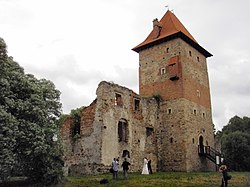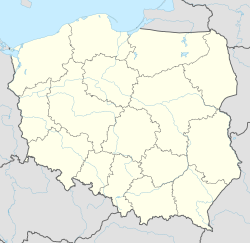Chudów [ˈxuduf] is a village in the district of Gliwice County, within the municipality of Gmina Gierałtowice, Silesian Voivodeship, in the historical region of Silesia.[1] It lies approximately 3 kilometres (2 mi) east of Gierałtowice, 12 km (7 mi) south-east of Gliwice, and 16 km (10 mi) west of the regional capital Katowice.
Chudów | |
|---|---|
Village | |
 Chudów castle | |
| Coordinates: 50°13′0″N 18°47′0″E / 50.21667°N 18.78333°E | |
| Country | |
| Voivodeship | Silesian |
| County | Gliwice |
| Gmina | Gierałtowice |
| Population (2012) | 1,493 |
| Website | Chudów |
History
editThe village was first mentioned in 1295 as Chudow attested in the Latin manuscript Liber fundationis episcopatus Vratislaviensis. Chudów was a privately owned medieval manor purchased in 1532 by the Roman-German Silesian nobility House of Saszowski family,[2] who already owned the neighbouring manor of Gierałtowice.[3][4] Chudów is famous for its 16th-century Renaissance castle residence, built by the nobleman and scion John Saszowski von Geraltowitz (alias Geraltowsky in German, Gierałtowski in Polish).[3][4][5] The village remained part of the House of Saszowski estates and a residence of its branch scions alias Geraltowsky von Geraltowitz (in Polish: Gierałtowski z Gieraltowic) until it was sold in the first half of the 17th century.[4][5] Historical sources say, it was one of the most magnificent castle residences in Upper Silesia, host to many banquets and sport hunting activities of the aristocracy, in later times even included its own castle brewery and inn.[4][5] The original entrance to the castle was via a drawbridge over the moat, which lead directly to the second floor of the castle tower.
In 1706, new owners of the castle was the family Foglarów.[4][5] After 1768, the castle changed owners quite often, losing in importance.[4][5] In 1837, the castle owner Alexander von Bally, made several reconstructions to the original design of the castle.[4][5] The castle suffered severe fire damage in 1875, and its last owner left it as a picturesque ruin.[4] Abandoned to ruin since the late 19th century, only parts of the walls, four-sided tower and outline of the moat survived to the present day.[4] In 1995, the newly founded Chudów Castle Foundation, has since began gradual castle restoration and reconstruction work.[4][5] Since 1966 the castle ruin is under registration No. A/568 categorized as of significant cultural value and tracked as objects of cultural heritage in Poland by the National Heritage Board of Poland.
In an already restored tower, there is a small museum that shows one of the most interesting exhibitions of ceramic medieval Gothic cocklestove tiles found in Poland, discovered on the castle grounds during restoration works and archaeological excavations.
Since 2000, the Chudów Castle Foundation organizes in August an annual medieval fair along with historical reenactments of medieval tournaments and warfare on Chudów castle grounds.[4]
See also
editReferences
edit- ^ "Central Statistical Office (GUS) - TERYT (National Register of Territorial Land Apportionment Journal)" (in Polish). 2008-06-01.
- ^ Okolski, Szymon (1641). Orbis Polonus splendoribus coeli, triumphis mundi, pulchritudine animantium condecoratus, in quo antiqua Sarmatorum gentiliata pervetusta nobilitatis insignia etc. specificantur et relucent [Polish Encyclopedia of the ancient Sarmatian families, the history of the coats of arms of the nobles of Poland old and new, their origin as awards for honorable deeds and the arms themselves specifically described and emblazoned] (in Latin). Vol. III. Kraków: In Officina Typographica Francisci Cæsarii. pp. 94–98. Archived from the original on 2019-06-01.
- ^ a b Bielski, Marcin; Bohomolec, Franciszek (1764). Zbior dzieiopisow polskich: Kronika Marcina Bielskiego [Collections from Polish Historians: Chronicles of Marcin Bielski] (in Polish). Vol. I. Warsaw: W Drukarni J.K. Mci y Rzeczypospolitey. p. 587.
- ^ a b c d e f g h i j k Castle Chudów (Polish Zamek w Chudowie) (in Polish)
- ^ a b c d e f g Chudów Castle Foundation (in Polish) Archived 2014-02-22 at the Wayback Machine

